












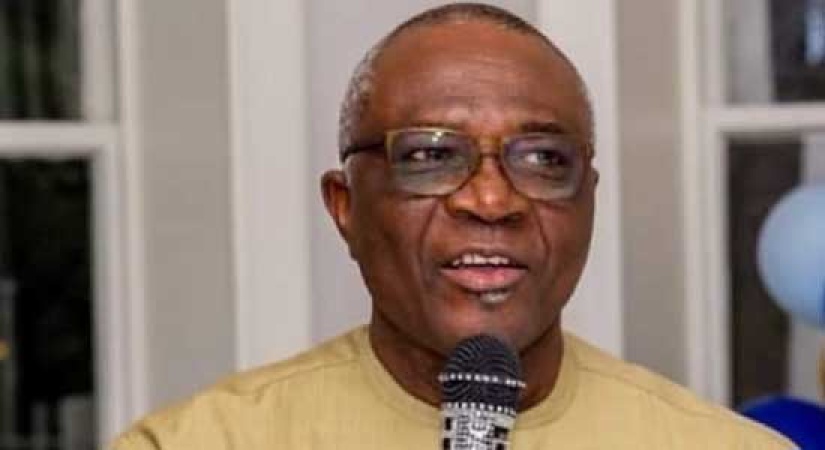



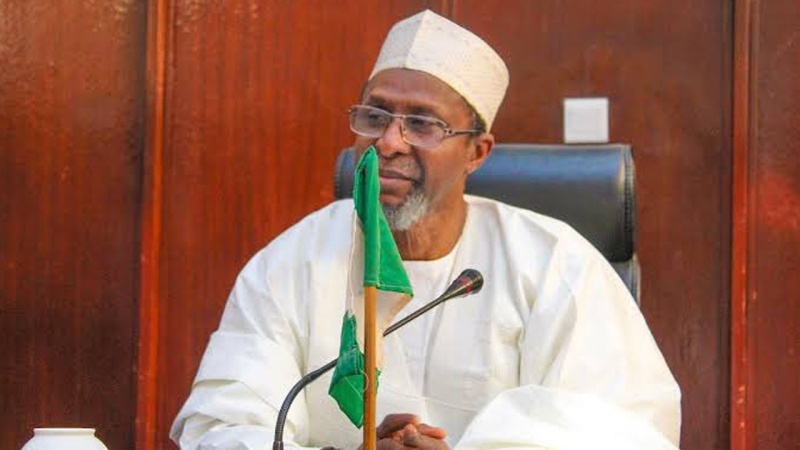

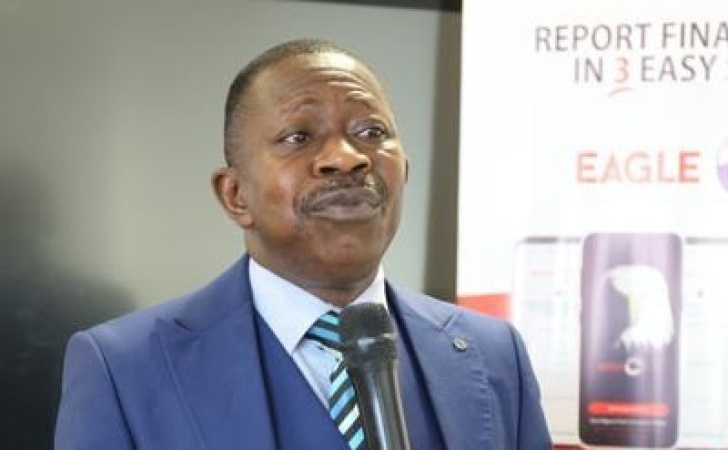
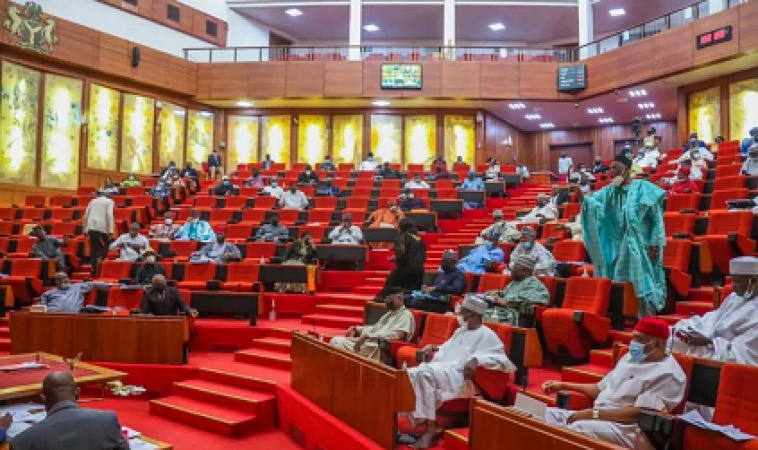

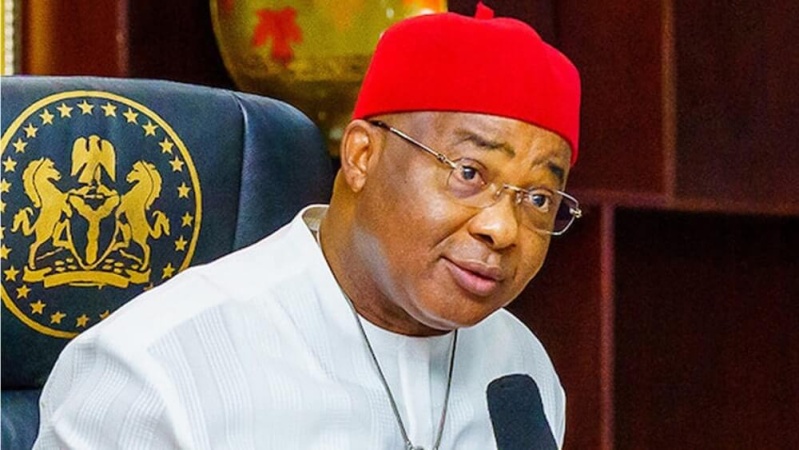
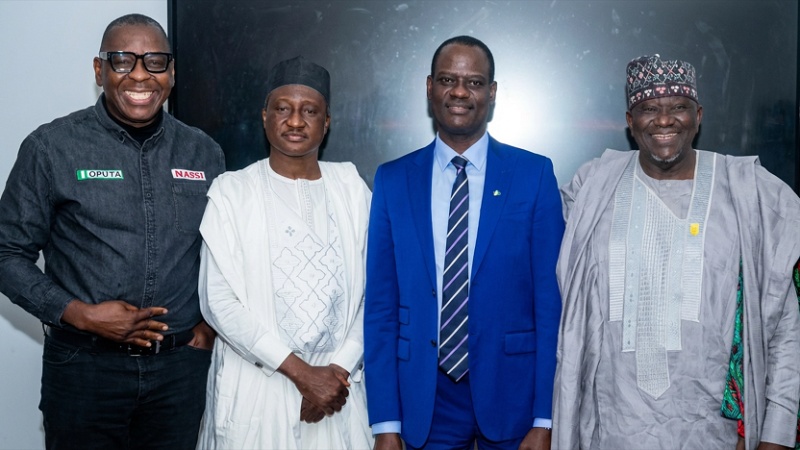
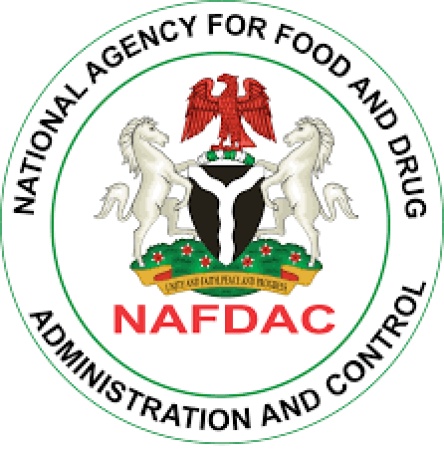

Loading banners


NEWS EXPRESS is Nigeria’s leading online newspaper. Published by Africa’s international award-winning journalist, Mr. Isaac Umunna, NEWS EXPRESS is Nigeria’s first truly professional online daily newspaper. It is published from Lagos, Nigeria’s economic and media hub, and has a provision for occasional special print editions. Thanks to our vast network of sources and dedicated team of professional journalists and contributors spread across Nigeria and overseas, NEWS EXPRESS has become synonymous with newsbreaks and exclusive stories from around the world.

Aliko Dangote, Founder and President of the Dangote Group
The Founder and President of the Dangote Group, Alhaji Aliko Dangote, has cautioned against using the cry of monopoly to discourage indigenous investment and industrial growth in Nigeria, saying no one was prevented from investing in the country.
Dangote said this at the 2025 Inaugural Annual Downstream Petroleum Week, organized by the House of Representatives Committee on Petroleum Resources (Downstream) on Monday.
Represented by the Group Chief Strategy Officer at Dangote Industries Limited, Aliyu Suleman, he encouraged focus on policies that encourage productivity, innovation, and competition.
Addressing the issue of monopoly with the refinery, he said, ?Too many people with the means to build industries chose instead to invest abroad. We decided from afar while adding little value to our economy. We have chosen differently. We have chosen to go to Nigeria. We have chosen to build here, to employ here, to produce here. So let us not use the cry of monopoly to start from growth. No one is prevented from investing. We welcome others to build their own refineries, and we will offer support in whatever way we can.?
?Nigeria holds the natural competitive advantage in refining. We enjoy proximity to oil and gas supply. We should therefore work together to develop this sector.
?We should work to enact and implement laws that will help this sector to prosper. Let us protect our industries and deliver the economic transformation this country deserves.?
He said today, the Dangote Refinery can meet all of Nigeria?s demand for diesel and jet fuel and still have a surplus for exports.
Dangote said that soon, the refinery would be listed on the stock exchange, giving Nigerians the opportunity to become shareholders of this national asset.
He said Africa?s refining sector remains underdeveloped, both relative to its consumption and relative to the volume of crude that is produced in Africa.
?While Europe and Asia refine over 95 % of their petroleum product, Africa refines only 40%. In sub-Saharan Africa, there are very few large functional refineries today. This is understandable because refining is capital-intensive, it is technologically complex, and often is a low-margin business. So as a result, many entrepreneurs and governments have chosen to stay away. But at Dangote, we are known for taking bold steps. We are known for making large-scale investments to substitute imports and create value in the country.
?Therefore, this is a challenge that we were happy to take. When it came to tackling the refining challenge, we decided to do it even though it was not easy. Building a world-class refinery anywhere in the world is a huge task. It is capital-intensive and very demanding. To build ours, we collected over 2,700 hectares of land, pumped 65 million cubic meters of sand to stabilize the site, installed over 250,000 foundation bars, and laid millions of meters of piping, cabling, and wiring. At peak, we had over 60,000 people on site, of which 50,000 were Nigerians. We had these people working around the clock across hundreds of disciplines and nationalities.
?Today, the Dangote refinery can meet all of Nigeria?s demand for diesel and jet fuel and still have surplus for exports, which can be used in valuable foreign exchange for Nigeria. The refinery can meet 90 % of Nigeria?s PMS requirements. This is based on the official consumption numbers of 50 million per day. Our views are the real consumption, perhaps more about 40 million, in which case we should be able to meet demand.
?Across the world, major oil producers typically meet their petroleum product requirements through their own domestic refineries, not through imports. The United States, for example, imports only about 8 % of its petroleum product requirements. If you look at most of the major crude oil producers, you will see that they do not import more than 10 % of their petroleum products from the US. This is where Nigeria should be heading. And with the advent of the Dangote refinery and unbundling of the sector, we hope that we will get there.
?At the Dangote Group, our strategy across all our businesses is to provide our customers with high-quality products at attractive prices. Not just in the refinery, across all the businesses. Same in cement, sugar, and the rest. Refined products from our refinery are of higher quality, and yet our prices are below import parity and below the average prices across most African countries. Across Africa, PMS and diesel sell for around $1 per litre, net of a tax system of sorts. But in Nigeria, the current price is below $0.60 per litre.
?This is a huge cost benefit for Nigerians. Even though the cost-benefit may not be immediately obvious, because before the advent of the Dangote refinery, subsidies were used to mask the real market price. Still, despite all this, we find ourselves in a situation where Nigeria imports petroleum products, while at the same time, Dangote refinery is exporting. This is a paradox that we must address for this sector to grow.
?Beyond energy security, domestic refining brought economic benefits. Refineries deliver job creation, skill development, industrial linkages, and exchange rates. The shipping sector is handling much more volume than it used to handle before now. Engineering capacity is strengthened.
?Across Dangote, NNPC, and the modular refineries, Nigeria has over one million barrels per day of installed domestic refining capacity. These benefits will multiply if we enable this capacity to operate fully. Across our businesses, the Dangote Group typically focuses on manufacturing, while accessing its distributors with the logistics required to deliver to their customers. Across Africa, we have over 10,000 trucks that deliver products for our distributors. The same operating model applies to refining. We must all work together to reduce distribution costs in order not to burden Nigeria?s energy efficiency.
?Historically, marketers source products from abroad and supply the country via coastal storage terminals. Today, there is a domestic alternative. We must therefore find an optimal split of off-take between trucks loading directly at the refinery, versus loading into vessels for transportation to various storage terminals. It does not make economic sense to move products by ship to a nearby coastal depot at additional cost when the same volume could have been evacuated by trucks directly from the refinery.
?We are also working with NPA and the NIMASA to find ways to reduce coastal transport costs, as this adds up to the total product costs that end up being passed on to Nigerians. That said, Nigeria?s fighting potential is massive. We are in a place where we can build a refining hub that will process crude from Nigeria, surrounding African countries, and supply the Nigerian commonwealths.
?When we entered the cement sector, Nigeria produced less than two million tons per year. I was totally dependent on imports. Today, through visionary investment, timing execution, and government support, we have 2 million tons of capacity across Africa, and we?ll reach 60 million by next year. Nigeria is now a leading exporter of cement, and by 2027, we plan to export 500 million dollars? worth of cement and clean cap annually. The same transformation is happening in refining
?Nigeria is now a net exporter of refined petroleum products, polypropylene, and urea. This is a historic turnaround. And we?re not getting started. Soon, the Dangote Refinery would be listed, giving Nigerians the opportunity to become shareholders in this national asset.
?Given its potential, this sector must be nurtured and protected. The current import licensing regime, where import licenses are issued without considering domestic supply, has exposed domestic refineries to unfair competition. This is because most of this import comes from Russia, and products from Russia are produced with crude that is priced at 25 dollars per barrel, cheaper than Nigerian crude because of the sanctions.
?So this in a way, it is almost like dumping, which hurts domestic refineries. Aside from the crude for naira initiative, graciously introduced by Mr. President, local refineries grant the individual protection or incentives. ?
Speaker of the House of Representatives, Rt. Hon. Abbas Tajudeen called on stakeholders in the petroleum industry to work collaboratively to reposition Nigeria?s downstream sector for sustainable growth, transparency, and innovation.
He said the event?s theme, ?Celebrating Our Successes, Confronting Our Challenges and Finding Solutions for the Petroleum Downstream Sector,? reflected the country?s need to celebrate progress while tackling long-standing challenges through collaboration and self-assessment.
The Speaker, who was represented by his deputy, Rt. Hon. Benjamin Kalu, said the conference should serve as a defining moment in reshaping the downstream petroleum landscape.
He noted that Nigeria is at a critical juncture in its industrialization drive and commended President Bola Ahmed Tinubu for the ongoing reforms under his Renewed Hope Agenda, which, he said, are revitalizing key sectors of the economy, including oil and gas.
Abbas particularly lauded the operational take-off of the Dangote Refinery, describing it as a turning point in Nigeria?s quest for energy self-sufficiency.
He said the anticipated emergence of other private refineries underscores the need for a functional and enabling environment that will encourage investment, promote efficiency, and reduce dependence on fuel imports.
The Speaker recalled that much of the progress recorded in the petroleum sector was made possible by the landmark Petroleum Industry Act (PIA) 2021, which restructured the Nigerian National Petroleum Company (NNPC) into a commercial entity and established regulatory agencies such as the Nigerian Upstream Petroleum Regulatory Commission (NUPRC) and the NMDPRA.
He said the PIA has renewed investor confidence, promoted transparency, enhanced competition, and curbed oil theft and inefficiencies. Abbas reiterated that the National Assembly remains committed to crafting laws and policies that strengthen the downstream sector and ensure it contributes meaningfully to national development.
Chairman of the House Committee on Petroleum Resources (Downstream), Hon. Ikenga Imo Ugochinyere, called for stronger collaboration among stakeholders to sustain ongoing reforms and build a transparent, self-reliant, and globally competitive downstream petroleum industry.
He described the summit as more than a formal gathering, but a national dialogue aimed at repositioning the downstream petroleum sector as a driver of economic growth, innovation, and industrial development.
According to him, the event, themed ?Celebrating Our Successes, Confronting Our Challenges and Finding Solutions for the Petroleum Downstream Sector,? represents a commitment to transparency, accountability, and progress.
He noted that the legislature, through the Petroleum Industry Act (PIA), had provided the legal foundation for reform, while the executive?s decision to remove fuel subsidies and liberalize the market restored efficiency and investor confidence.
Ugochinyere commended the Nigerian Midstream and Downstream Petroleum Regulatory Authority (NMDPRA) and the Nigerian Upstream Petroleum Regulatory Commission (NUPRC) for their professionalism in implementing reforms and ensuring that Nigeria?s energy transition remained credible and investor-friendly.
He also paid tribute to the Crude Oil Refiners Association of Nigeria (CORAN) for their courage and foresight in investing in local refining despite uncertainties that had kept some foreign investors on the sidelines.
He described their efforts as proof that Nigerian enterprise and innovation could drive industrial transformation and job creation.
Highlighting recent achievements in the downstream sector, Ugochinyere cited the expansion of Indorama Petrochemicals? urea and fertilizer capacity to 2.8 million metric tonnes per annum, the scaling up of Waltersmith Modular Refinery in Imo State from 5,000 to 50,000 barrels per day, and the progress of the OPAC Refinery in Delta State.
He said the Dangote Refinery, now Africa?s largest at 650,000 barrels per day, symbolizes a new era of energy self-sufficiency and regional stability. According to him, these milestones, combined with over $13 billion in upstream investments in 2024, reflect renewed investor confidence in Nigeria?s oil and gas sector.
The lawmaker also lauded the NUPRC for enforcing the Domestic Crude Oil Supply Obligation (DCSO), which mandates producers to prioritize crude supply to local refineries before exports.
He said the policy marks a shift from rhetoric to action, ensuring local value addition, job creation, and energy independence.
To deepen reforms, Ugochinyere announced plans by his committee to push new legislative measures granting local refineries the first right of refusal on crude allocations, streamlining regulatory processes, and introducing a Refinery Protection and Promotion Bill to classify refineries as strategic national assets.
These, he said, would guarantee stability, protect investments, and promote growth across the value chain.
On labour relations, Ugochinyere emphasized that no reform can succeed without industrial harmony, urging dialogue over disruptions in resolving disputes between industry players and unions.
The Minister of State for Petroleum Resources (Gas), Ekperikpe Ekpo, called for sustained collaboration between the Executive and Legislature to address lingering challenges in Nigeria?s downstream petroleum and gas sectors.
Ekpo said the continued reform and stability of the sector required policy consistency, private sector participation, and adherence to global best practices.
He commended the Committee for convening the conference, describing it as evidence of the National Assembly?s leadership in promoting dialogue, transparency, and reform in the petroleum industry.
?The theme of this year?s conference, ?Celebrating Our Successes, Confronting Our Challenges, and Finding Solutions,? is both timely and profound,? Ekpo said. ?It invites us to reflect on how far we have come, acknowledge the challenges before us, and collectively provide sustainable solutions that secure the future of Nigeria?s downstream industry and ensure lasting progress.?
The minister highlighted significant progress made in recent years, including the implementation of deregulation policies, market liberalization, and renewed private investment in domestic refining and storage capacity.
He said President Bola Ahmed Tinubu?s Renewed Hope Agenda had brought new urgency to reforms within the gas value chain, driven by the Decade of Gas initiative, which seeks to deepen domestic gas utilization, expand infrastructure, and accelerate the transition to cleaner fuels such as Compressed Natural Gas (CNG), Liquefied Natural Gas (LNG), and Liquefied Petroleum Gas (LPG).
?These efforts are designed to enhance energy accessibility, reduce dependence on imported fuels, and create new economic opportunities for Nigerians, from households and small businesses to large-scale industries,? Ekpo noted.
While celebrating these achievements, the minister acknowledged that persistent issues, such as infrastructure deficits, market vulnerabilities, supply chain inefficiencies, and regulatory uncertainty, continue to hinder progress.
?Addressing these challenges requires sustained collaboration between the Executive and Legislature, underpinned by sound policy direction and consistent implementation,? he said. ?It is also a call for enhanced private sector participation, investment in technology, and adherence to global practices.?
Ekpo reaffirmed that the Ministry of Petroleum Resources (Gas) is focusing on three key priorities to drive reform and stability in the sector: accelerating gas infrastructure development, promoting gas utilization, and implementing regulatory and investment reforms.
According to him, ongoing projects such as the OB3 pipeline, the West African Gas Pipeline, and the Nigeria?Equatorial Guinea Gas Partnership are crucial to improving connectivity and supply reliability. He added that the Federal Government is also promoting the use of CNG and clean energy solutions for households, transport, and small businesses to ensure a just energy transition.
The minister stressed that transforming Nigeria?s downstream and gas sectors cannot be achieved by the government alone. ?It requires the combined effort of the Legislature, the Executive, the private sector, and the Nigerian people,? he said.
He urged stakeholders to remain committed to partnership, innovation, and accountability in driving reforms that will make energy more affordable, accessible, and sustainable for all Nigerians.
?Together, we can build a downstream sector that truly supports industrialization, creates jobs, and delivers prosperity across our nation,? he said.
Ekpo once again commended the House Committee on Petroleum Resources (Downstream) for its vision and leadership in hosting the annual conference, which he described as critical to building consensus for the sustainable growth of the energy industry. (The Nation)